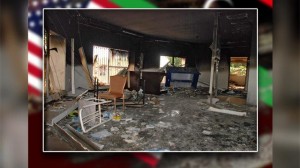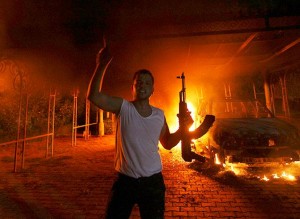 On the night of the Benghazi terror attack, special operations put out multiple calls for all available military and other assets to be moved into position to help — but the State Department and White House never gave the military permission to cross into Libya, sources told Fox News.
On the night of the Benghazi terror attack, special operations put out multiple calls for all available military and other assets to be moved into position to help — but the State Department and White House never gave the military permission to cross into Libya, sources told Fox News.
The disconnect was one example of what sources described as a communication breakdown that left those on the ground without outside help.
“When you are on the ground, you depend on each other — we’re gonna get through this situation. But when you look up and then nothing outside of the stratosphere is coming to help you or rescue you, that’s a bad feeling,” one source said.
Multiple sources spoke to Fox News about what they described as a lack of action in Benghazi on Sept. 11 last year, when four Americans, including Ambassador Chris Stevens, were killed.
“They had no plan. They had no contingency plan for if this happens, and that’s the problem this is going to face in the future,” one source said. “They’re dealing with more hostile regions, hostile countries. This attack’s going to happen again.”
Under normal circumstances, authorities in Benghazi would have fallen under the chief of mission, one source said — the person in charge of security in the country who in this case was Stevens. But once Stevens was cornered and members of his security detail pushed his distress button, that authority would have been transferred to his deputy. However, that deputy was out of the country.
 That meant the authority then reverted directly to the U.S. State Department, and oversight of the response to the attack that night fell to then-Secretary of State Hillary Clinton and Undersecretary of State Patrick Kennedy, who were calling the shots.
That meant the authority then reverted directly to the U.S. State Department, and oversight of the response to the attack that night fell to then-Secretary of State Hillary Clinton and Undersecretary of State Patrick Kennedy, who were calling the shots.
Sources said that shortly after the attack began around 9:40 p.m., special forces put out the calls for assets to be moved into position.
“What that does is that enacts … every asset, every element to respond and it becomes a global priority,” one source said. “I would tell you that was given and the only reason it was given is because of special operations pack.”
However, the source said, “Assets did not move.”
The failure of the State Department or White House to give the military permission to go into Libya, according to the source, only accentuates the significant breakdown in communication among the State Department, military, CIA and White House.
“I can see the initial confusion in the beginning. I mean, you have a situation that’s developing. The problem with the State Department is they don’t have procedures in place. And if they do, they haven’t practiced or exercised them. And now they are making up for all the mistakes they have made, with excuse. And there is no excuse,” the source said, describing a “huge breakdown between State and military.”
Last October, then-Defense Secretary Leon Panetta defended the response, saying the military was reluctant to put forces at risk.
“You don’t deploy forces into harm’s way without knowing what’s going on, without having some real-time information about what’s taking place,” Panetta said. “And as a result of not having that kind of information, the commander who was on the ground in that area, General Ham, General Dempsey and I felt very strongly that we could not put forces at risk in that situation.”
The State Department Accountability Review Board, which investigated the attack and what led up to it, also claimed that “Washington-Tripoli-Benghazi communication, cooperation, and coordination on the night of the attacks were effective.”
But one source told Fox News there was “not good communication” between State and Defense “on any level.”
By Adam Housley / Published May 02, 2013 / FoxNews.com

Leave a Reply